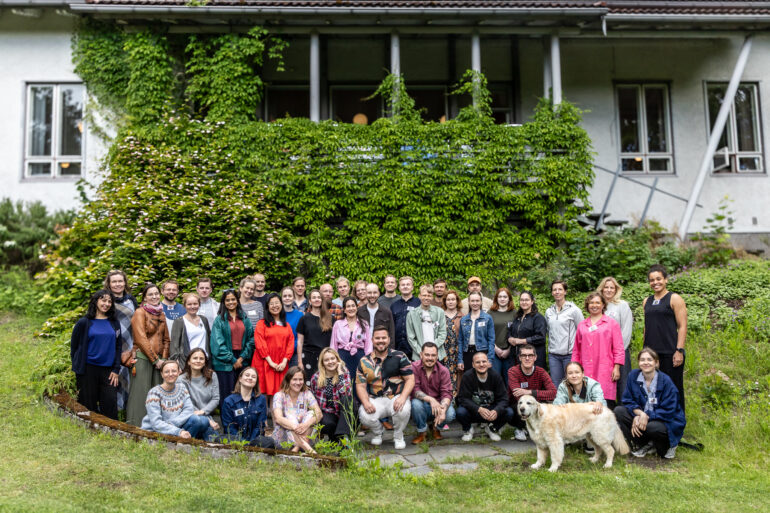Written by: Davide Abbatescianni
23.02.25
During the event, three experts introduced a new method for developing stories “ahead of time” by presenting a tool, a case study and hosting a brief interactive session.
As the film industry grapples with rapid societal change, the panel “Future Narratives – Utilising Societal Insight in Development” aimed to equip producers with the tools to craft future-facing stories.
The session, held on 16 February at the Producers Hub during this year’s European Film Market (EFM), was led by Demos Helsinki representatives Mikko Annala, Vera Djakonoff, and Annika Ranin. Organised by Cassandra Visions, the event explored how emerging societal trends can be transformed into compelling narratives.
Cassandra: How Storytelling Can Shape Culture
Ranin opened the session by reflecting on how cinema does not merely mirror the world, but actively shapes the future and, conversely, our culture. “People collectively understand their moment in time, and there is an increasing urgency around global issues,” she stated. She emphasised that storytellers need “structured tools” to make their creative processes “more systematic, accurate, and impactful”.
Given that the average timeline for film production is between two and five years, Ranin highlighted the necessity of staying several steps ahead of emerging societal changes. By offering insights into global transformations, filmmakers can integrate these elements into their work before they fully unfold or as they emerge.
The event was divided into three parts. The first, titled “What is Cassandra?”, introduced the tool; the second, “How Does It Work?”, consisted of a case study demonstration; and the third, “How to Use It?”, served as an interactive workshop involving the industry audience.
Annala elaborated on the inspiration behind the tool, drawing from the Greek myth of Cassandra — a noblewoman granted the power of prophecy by Apollo, but later cursed by the gods to see the future while never being believed. “We at Demos Helsinki think about this story a lot,” noted Annala, adding that the team often deals with major questions affecting humanity, such as “Who will control technology?”, “How will we care for ageing populations?”, and “Will democracies survive?”
As a non-profit think tank, Demos Helsinki focuses on creating positive societal transformation, he underscored. The Cassandra framework is built around key principles: enhancing participation, reducing social inequality, staying within planetary boundaries, and promoting non-violent transformation. While their primary work lies in policymaking and strategy, Annala stressed that “real change happens through culture and stories. If you don’t engage with culture, even the most progressive policies will struggle to take effect.”
A case study: Baby Box
Cassandra helps build new stories in three distinct phases: theme identification, story conceptualisation, and story development.
A case study was presented on Baby Box, a feature film in development with Helsinki-based Yellow Film & TV. The project explores Finland’s transition from a poor agricultural country with high infant mortality into one of the world’s happiest nations. According to the Demos team, this story has the potential to resonate powerfully in a moment of global crisis, as it highlights how hardship and suffering can be overcome by investing in healthcare and education.
At the heart of Baby Box is pioneering Finnish paediatrician Arvo Ylppö (1887–1992), himself born prematurely. His work led to the establishment of maternity clinics across Finland and the creation of the titular baby box, a revolutionary initiative in neonatal care. The film follows the physician as he evacuates a hospital during the Winter War bombings, saving 50 children, while reflecting on his life and Finland’s journey of resilience and progress.
A brief interactive workshop: Future Scenarios in Storytelling
Djakonoff led the final segment, an interactive exercise blending creative ideation with future analysis. Participants were offered three different “What If” scenarios. For example, one envisioned a world where attention spans are a luxury and AI-driven addiction skyrockets, prompting questions such as: “Who retains decision-making power?” and “Which social groups remain protected from addiction? Which ones don’t?”
The second scenario involved geoengineering. Inspired by real-world climate interventions, this scenario examined the societal impacts of total weather manipulation, referencing cloud-seeding experiments conducted in the Emirates and Indonesia. “Who would suffer from this dystopian scenario, and who would benefit from it?” was one of the questions that emerged.
Attendees engaged in the workshop by scanning a QR code, responding to prompts, and collectively brainstorming creative solutions with Djakonoff and her colleagues. Ideas for different scripts and characters emerged, spanning genres such as mockumentaries, comedies, dramas, action, and, predictably, sci-fi.
The session demonstrated how structured future analysis might be able to inspire richer, more relevant storytelling in an ever-changing world. Whether this approach will become common practice in writers’ rooms remains to be seen, however.
